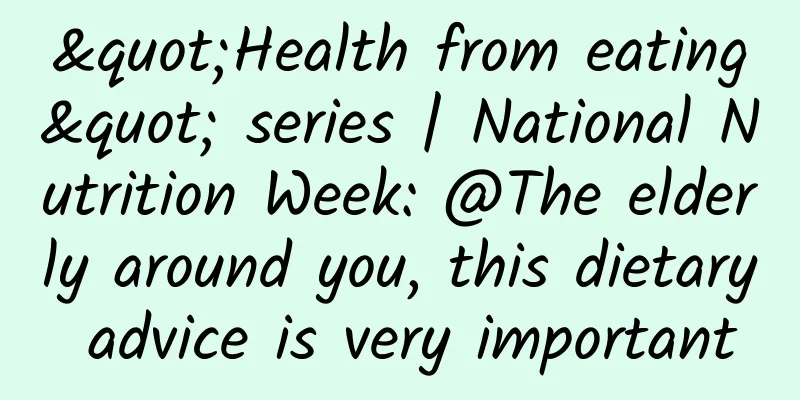Middle-aged and elderly people really shouldn’t be vegetarians for a long time! This is equivalent to “chronic suicide”

|
In a recent variety show "Flowers Along the Way", a celebrity talked about "being a vegetarian" and said that his friend had been a vegetarian for a long time, which resulted in bone loss and she had to use crutches to walk. He also said that she looked old and by the time he persuaded her to eat meat, it was too late. In fact, this is not an isolated case. "Not eating meat but only eating vegetarian food" has been praised by many middle-aged and elderly people as the "secret to health and wellness". Some even go so far as to say "meat protein and dairy products are the root causes of modern diseases, and vegetarian food can prevent and treat various chronic diseases", "meat, eggs and milk are the root causes of geriatric diseases", etc., as if only vegetarian food can maintain health. No! Eating only vegetarian food for a long time can easily lead to insufficient intake of nutrients such as vitamin B12, iron, zinc, and calcium, which can cause anemia, sarcopenia and other diseases. Middle-aged and elderly people should pay special attention to this! What is vegetarianism? There are usually two types of vegetarianism. One is lacto-ovo vegetarianism, which eats eggs and milk (some people eat eggs but not dairy products, or eat dairy products but not eggs), which is called "lacto-ovo vegetarianism"; the other is pure vegetarianism, which does not eat any animal-derived food at all, and does not eat milk or eggs, which is often called "pure vegetarianism." Copyright images in the gallery. Reprinting and using them may lead to copyright disputes. The healthy growth and life activities of the human body require a comprehensive and balanced nutrition of high-quality protein, carbohydrates, fatty acids, vitamins, minerals, etc. Moreover, some of these nutrients are abundant in animal foods but not common in plants. This is why dietary recommendations from various countries recommend that we should have a combination of meat and vegetables and a diversified diet. In theory, humans can obtain the nutrients they need through a vegetarian diet. But in reality, the implementation process is extremely complicated and cumbersome. It requires the support of very professional food nutrition professionals and nutritionists. Otherwise, it is difficult to provide the human body with enough nutrition to meet health needs. Celebrities with high incomes can afford the cost of hiring private nutritionists and purchasing various nutritional supplements, but for ordinary people, it is very difficult. What nutrients are likely to be lacking if you are a long-term vegetarian? When non-professionals choose a vegetarian diet without health guidance, there are often many misunderstandings and risks. They may not understand the balanced combination of vegetarian nutrition, which leads to serious deficiencies in certain nutrients. These deficiencies may not have obvious symptoms in the early stages and are easily ignored. By the time obvious health problems appear, irreversible damage has often been caused. Vegetarian diets are prone to the following nutritional deficiencies: 1 Minerals such as calcium, iron, zinc Dairy products are the most ideal food for obtaining calcium. Although dark green vegetables and traditional soy products can be used as sources of calcium, the presence of tannic acid and oxalic acid in plant foods hinders calcium absorption, resulting in low efficiency in providing calcium. Iron and zinc are rich in meat and aquatic products and are well absorbed, but plant foods have low iron and zinc content and poor absorption. Therefore, vegetarians are very likely to lack these mineral elements. 2 Vitamin B12 Vitamin B12 is only found in animal foods, not plant foods. Vegetarians are particularly prone to deficiency. Vitamin B12 deficiency can affect multiple systems, causing mild fatigue and even neurological damage in severe cases. 3 Essential fatty acids such as DHA and EPA DHA is mainly found in aquatic fish and shrimp. Although α-linolenic acid in plant foods such as flaxseed oil can be converted into DHA, the conversion efficiency is very low. It is difficult to obtain enough DHA by eating plant foods alone. Copyright images in the gallery. Reprinting and using them may lead to copyright disputes. 4 protein Protein is an important raw material for making new tissues in the body, including skin, hair, nails, bones, muscles, etc., and promotes growth and development; it can be said that protein is the most critical nutrient for human growth and development. The amino acid composition of protein in eggs, milk, and meat is closer to the needs of the human body and is easy to digest, so it is called "high-quality protein." Vegetarianism can easily lead to insufficient intake of high-quality protein and a lack of essential amino acids. 5 Vitamin D We rarely get vitamin D from our daily food, mainly from cod liver oil and aquatic products such as fish and shrimp, and a small amount in cheese and egg yolk. It is easy to be deficient in vitamin D if you only eat vegetarian food. Vitamin D deficiency affects bone health. Long-term vegetarian diet, These two diseases are most harmful to the elderly. Long-term vegetarianism can cause serious health problems, especially for the elderly. For the elderly, special attention should be paid to the following two diseases: 1 anemia Many women know that anemia is a very uncomfortable problem. Not only does it make you look pale and ugly, but it also makes you dizzy, easily fatigued, and lack of energy. Meat is rich in heme iron, which is the raw material for blood production and has a high absorption rate. If you always don't eat meat and don't specifically supplement iron, it is easy to cause the most common anemia - iron deficiency anemia. In addition, not eating meat for a long time may also cause people to lack vitamin B12, which can also lead to serious problems such as anemia. Copyright images in the gallery. Reprinting and using them may lead to copyright disputes. Data from the Chinese Residents’ Nutrition and Chronic Disease Status Report (2020) show that the anemia rates among people aged 60 and above in my country are 10.1% (male) and 11.2% (female). 2 Sarcopenia Sarcopenia, the main manifestation is just what it means literally, muscle mass reduction, muscle atrophy, and muscle strength reduction. This is more common among the elderly, and nearly half of the elderly will suffer from it. An important cause of sarcopenia is insufficient protein intake. Many people think that such elderly people look thinner in appearance, which is a sign of health. Sarcopenia is very harmful to the elderly. Once muscle loss continues and strength decreases, the incidence of falls, fractures, osteoporosis, osteoarthritis, etc. will increase significantly. This is also the reason why the friend mentioned at the beginning of the article lost bone mass as a result of being a vegetarian and had to use crutches to walk. Using crutches is a small matter. For the elderly, accidental falls are even more terrible and can easily be fatal. For example, hip fractures, which are not uncommon, may have a mortality rate of more than 20% within a year, and even as high as 50%. Copyright images in the gallery. Reprinting and using them may lead to copyright disputes. Meat is an important source of protein. The protein needs of the elderly are actually no less than those of the young, and will increase after the age of 65. If you don't eat meat and have no other way to supplement, it is easy to be protein deficient, which will lead to sarcopenia and even other malnutrition problems over time. Data from the National Nutrition and Health Survey from 2010 to 2012 showed that the incidence of malnutrition and nutritional risks among elderly patients were 16% and 37%, respectively, and the incidence of hypoproteinemia was 25.1%. Because of this series of health risks, my country's dietary guidelines clearly recommend that the elderly should eat plenty of meat, drink milk every day, and eat an egg every day. Avoid blindly following the trend of vegetarianism to keep your elders healthier Long-term vegetarianism is very harmful to health. Learning to eat meat, eggs and milk correctly is the key to improving the health of the elderly. Pay attention to the following three points: 1. Avoid a vegan diet: It is difficult to achieve a balanced nutrition on a vegan diet. It is recommended to consume a moderate amount of meat, eggs and milk every day, which is more beneficial to your health. 2. Moderate intake: Eating meat, eggs and milk in moderation will not cause the three high problems. Dietary guidelines recommend that the average person can eat 40 to 75 grams of livestock and poultry meat, 40 to 75 grams of aquatic products such as fish and shrimp, 25 to 50 grams of eggs (about one egg), and 300 to 500 grams of dairy products (about 1 to 2 cups of milk) per day. 3. Eat meat healthily: Eat in rotation: Eat a variety of meats, such as beef, mutton, chicken, duck, fish, shellfish, etc., to enrich the table. Less red and more white: give priority to white meat that is low in fat and easily digestible (such as chicken, fish, shrimp, etc.). Eat less fatty and cured meat: Avoid high-fat and high-salt meat, especially fatty meat such as pork belly, and meat cooked with heavy oil such as frying and grilling. Patients with high blood pressure, high blood sugar and high cholesterol should especially avoid this to reduce the risk of cardiovascular disease. References [1] MangelsAR, Messina V. Considerations in planning vegan diets: infants. J Am DietAssoc. 2001 Jun;101(6):670-7. doi: 10.1016/S0002-8223(01)00169-9 ↑ [2] Derin S, Koseoglu S, Sahin C, Sahan M. Effect ofvitamin B12 deficiency on olfactory function. Int Forum Allergy Rhinol.2016;6(10):1051-1055 ↑ [3] Li Gen, Zhen Fuhang, Lv Wenhao, et al. Research on the pathogenesis of sarcopenia in the elderly[J]. Journal of Brain and Nervous Diseases, 2019, 27(4): 257-261. ↑ [4] Su Lin, Liu Shuang, Dong Birong, et al. Nutrition and sarcopenia[J]. Electronic Journal of Tumor Metabolism and Nutrition, 2019, 06(1): 26-34. ↑ [5] "Dietary Reference Intakes for Chinese Residents (2023 Edition)" ↑ [6] Wang Liusen, Zhang Bing, Wang Huijun, et al. Current status of meat consumption patterns among the elderly in 15 provinces (autonomous regions and municipalities) in China [J]. Chinese Food and Nutrition, 2018, 24(10): 13-19. ↑ [7] Chinese Nutrition Society. Dietary Guidelines for Chinese Residents 2022. Planning and production Author: Ruan Guangfeng, Deputy Director of Kexin Food and Health Information Exchange Center Review丨Zhang Yu, researcher at the Chinese Center for Disease Control and Prevention, national health science expert Planning丨Fu Sijia Editor: Fu Sijia Proofread by Xu Lailinlin The cover image and the images in this article are from the copyright library Reprinting may lead to copyright disputes |
>>: Shen Gong...Gong...What animals are the true forms of the leopard family?
Recommend
Take stock of the flowers that bloom on summer nights and smell their fragrance to cool off
Produced by: Science Popularization China Author:...
The secret to quickly increase followers on a public account!
The ideal of many Internet newcomers is how to re...
Community business operation model: IP + community + scenario + sharing economy
The community is the shortest path for every bran...
Eating this fruit raw may lead to parasite infection!
Do you know something that can be eaten raw as a ...
Strategy for recalling old customers——RFM model and application!
Suppose for some reason, you need to recall your ...
I really want to ask: How is the ban on honking captured?
With the acceleration of urbanization, traffic pr...
3 tips for refined operation strategies!
As the cost of acquiring traffic gradually increa...
Poor sales of Samsung and Apple drag down Ericsson, making domestic mobile phones lambs to be slaughtered?
“-10%”. Ericsson's performance in 2016 can on...
Video of African children shouting Happy Birthday. How to send birthday wishes to African children?
Valentine's Day gifts, birthday gifts, confes...
How to process charges for 400 calls? How much are 400 calls charged?
Nowadays, the application of 400 telephones in do...
How to enable external storage permission for Tik Tok?
This article mainly introduces the relevant infor...
FF cuts all employees’ salaries by 20% due to financial difficulties. Who will be the new buyer after Xu Jiayin?
On October 22, an internal email from FF showed t...
Analysis of the 5 most accurate traffic channels for online marketing!
Traffic is a hot topic that all walks of life are...
Want to know more about the zoo? This is not only fun, but also serious!
On January 25, representatives of the Chinese and...
How much does it cost to make a Qinhuangdao fast food mini program? What is the quotation for the production of Qinhuangdao fast food mini program?
More and more businesses are paying attention to ...









